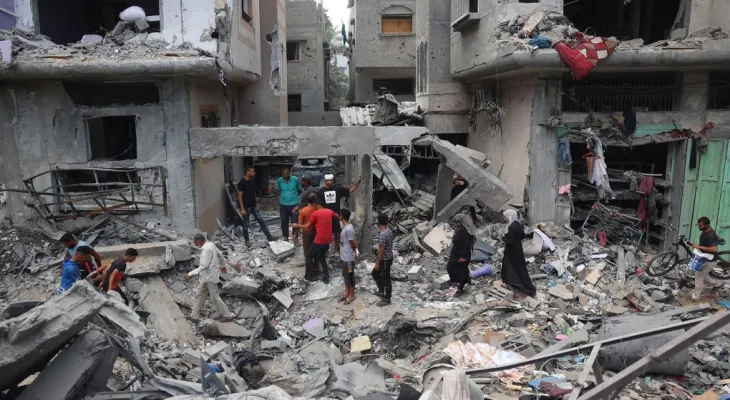Search here
Newspaper
Search here

Arab Canada News
News

Published: June 21, 2024
The Israeli military's chief spokesperson stated, "Hamas cannot be forced to 'disappear,' which raises doubts about whether the government's wartime goal of defeating the armed group can be achieved and provokes a sharp rebuke from Israeli Prime Minister Benjamin Netanyahu."
Israeli army spokesperson Admiral Daniel Hagari said on Wednesday during an interview with Israeli Channel 13: “The idea that Hamas can be destroyed, and that Hamas can disappear – is an excuse in the eyes of the public.”
Hagari's remarks elicited a terse response from Netanyahu's office, which stated that the Israeli security cabinet "set the destruction of Hamas's military and governance capabilities" as one of its war objectives in Gaza.
Netanyahu's office stated that the Israeli army is, of course, committed to this.
The Israeli army later sought to clarify Hagari's statements, asserting that it is committed to the government's wartime objectives and claimed that Hagari was only referring to Hamas "as an ideology and idea."
Despite the Israeli army's attempt to soften Hagari's comments, it appears that disagreements are deepening between the Israeli government and its military. Netanyahu is under increasing pressure from members of his government and Israel's allies, including the United States, to put forth a strategy for governing Gaza post-war after the devastating Israeli bombardment of the isolated territory.
In response to Hamas's attacks on Israel on October 7, when fighters killed over 1,200 people and took about 250 others hostage, Israel launched its war in Gaza with the primary aim of recovering the hostages, destroying Hamas's governance capability there, and ensuring that another attack cannot be launched from Palestinian territories.
However, after eight months of war, with the prospect of more to come, Hagari's comments reflected growing concerns that the Israeli military campaign may be unable to achieve those goals and that the group could remain a viable ideological force, despite Netanyahu's claim that it has a strong ideological grip. Over 14,000 Hamas fighters have been killed. CNN cannot independently verify this number.
Hagari stated in a separate interview with Kan 11, a network affiliated with CNN, that "telling the public that there will be no terrorism in Gaza, that there will be no military activists, no rockets, no armed men is a lie."
There will be terrorism in Gaza. Hamas is an idea deeply rooted in the hearts of the people of Gaza. In order to replace those who are providing civil services and distributing or stealing food supplies, something else must be established. This is a decision for the political level, and the army will implement it.”
Indicating that the Israeli cabinet may be scaling back its initial war objectives of destroying Hamas entirely, government spokesperson David Minser stated that eliminating "military and governance capabilities" of Hamas does not "necessarily mean" killing every member of the group.
Minser told reporters on Thursday that Hagari's comments did not harm the war effort but emphasized that the army's responsibility is to implement “the will of the elected government.”
During discussions on a U.S.-backed ceasefire plan, Netanyahu also appeared to retreat from his hardline rhetoric at the beginning of the war. A statement issued last week – reportedly from the Prime Minister's Office – noted that Israel would not end the war "before achieving all its wartime objectives: destroying Hamas's military and governance capabilities, securing the release of all hostages, and ensuring that Gaza does not pose a threat to Israel in the future."
The statement did not mention Netanyahu's repeated promise of achieving total victory, nor the complete elimination of Hamas.
Hagari's latest comments added to a growing series of public disputes between the Israeli government and the military. Last weekend, the Israeli army announced a daily “tactical pause” in military activity along a route in southern Gaza to allow for the distribution of aid – a decision that reportedly angered Netanyahu, according to an Israeli official who spoke to CNN.
Netanyahu contacted his military secretary and stated that the idea was unacceptable, but later backtracked after confirming that fighting in Rafah would continue, according to the official who spoke on condition of anonymity.
The Israeli army's decision to implement tactical pauses also drew sharp criticism from the increasingly vitriolic far-right faction in Netanyahu’s coalition. National Security Minister Itamar Ben Gvir stated that those who made the decision “are evil and foolish and should not remain in their positions.”
An Israeli army spokesperson later told CNN that the “tactical pause” decision was approved by Israeli Defense Minister Yoav Gallant.
While Israel has had some success in recovering those who were kidnapped on October 7 – either through a ceasefire agreement for hostages in November or a daring rescue operation to retrieve four individuals earlier this month – the hope that Israel may be able to recover the hostages is also dwindling.
A senior Hamas official told CNN that he "has no idea" how many of the remaining 120 hostages in Gaza are still alive and that any agreement for their release must include guarantees of a permanent ceasefire and the complete withdrawal of Israeli forces from Gaza.
Comments